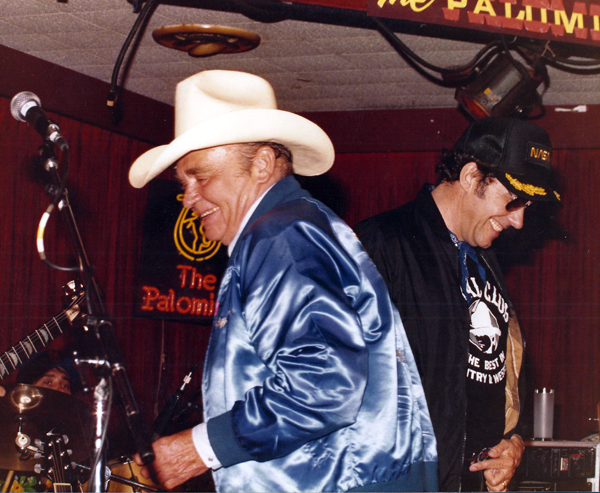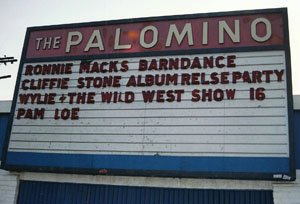

Left photo: Bobby Bare and Cliffie having a good laugh on stage at the legendary Palomino club. They first met in the mid-1950s and they became forever friends. Cliffie introduced me to Bobby and his wonderful wife, Jeanne, on our first trip to Nashville after we had gotten married; and from that time onward, we’d have dinner with them whenever we were in town on business. Cliffie’s quote from his songwriting book: “My dear buddy, Bobby Bare, is a perfect example of a singer who developed showmanship along the way, which is why he continues to enjoy immense popularity and his legion of fans continues to grow. A few years back, he was the Randy Travis of his era. Joan and I recently saw his sell-out show at the Crazy Horse Steakhouse in Santa Ana, CA, and what a performance he puts on! He sings all his old hits like “Five Hundred Miles,” “Detroit City,” “Tequila Sheila,” “The Winner” and “Marie Laveau.” Between songs, he tells humorous stories to his audience as only Bobby can! He, like Ernie Ford, has that country-boy charm which endears him to audiences all over the world. This is what makes him a great entertainer, for it keeps his faithful fans wanting more! And it was on a hot but fun-filled, nostalgic August evening in Nashville, Tennessee, at the National Songwriters Guild dinner, that Bobby was presented with the prestigious Aggie Award in 1990." In 2013, Bobby Bare was inducted into the prestigious “Country Music Hall of Fame.” Bobby Bare Mini-bio: From 1962 to 1983, Bobby Bare had approximately fifty-five Top 40 hits and his eclectic song material included country, folk, rock and novelty-type of tunes. Robert Joseph Bare was born on April 7, 1935 in Ironton, Ohio. He learned early on about heartbreak when his mother passed away five years later, which left Bobby, his two sisters and his father in disarray. He was raised on a farm and when his father remarried, Bobby eventually left to live with his grandmother and other relatives. Bobby found solace through music and learned how to play the guitar. He entered and won his first talent show contest at Rockhill High School by singing “Shot Gun Boogie,” which encouraged him to put together a small band and they performed on various local radio shows. In the mid-1950s, Bobby came to Hollywood where he met Cliffie Stone and he’d perform on Cliffie’s Hometown Jamboree shows; Bobby, along with Harlan Howard, Buck Owens, Jimmy Bryant, Billy Joe Shaver were some of the writers for Cliffie’s Central Songs publishing company which had two offices; one in Hollywood and one in Nashville. Bobby became good friends with Cliffie and many of his band members such as Jimmy Bryant and Speedy West. Bobby signed with Capitol Records and was under the supervision of Ken Nelson, who was head of Capitol’s Country Division. Bobby recorded some country and several rockabilly records, which weren’t successful. Eventually, Bobby left Capitol and signed with a smaller label, ‘Challenge.’ In the late 1950s, he received his draft notice and while he waited in Ohio to be inducted into the service, he hooked up with a singer friend of his, Bill Parsons. They decided to record a few tunes at King Records in Cincinnati, one being ‘Rubber Dolly,’ which Bill sang and the other being, ‘The All-American Boy’ which Bobby wrote and sang. While Bobby was in the army, Fraternity Records listened to the two aforementioned songs and they liked and released Bobby’s demo version of 'The All-American Boy' and Bobby's friend, Bill Parsons, was credited as the singer. It peaked at #2 on the Billboard Hot 100 pop charts (and it also peaked at #22 on the UK singles chart). During Bobby’s two years in the service, he entered several talent shows to keep his chops up. When his stint with the Army was over, he signed and recorded with Fraternity Records for a year or so (they also credited Bobby on future pressings of his ‘All-Americcan Boy’ hit song after they discovered their mistake). Since many of his songwriting friends, such as Harlan Howard, had moved to Nashville, Bobby decided to relocate there too. In 1962, Chet Atkins signed him to RCA Records and he had a hit with ‘Shame on You.’ In 1963, he recorded “Detroit City” and it peaked at #6, which was his first Top Ten country single; it was also a crossover and it peaked at #16 on the pop charts. “Detroit City” garnered Bobby a Grammy Award for ‘Best Country & Western Recording” in 1964. In this time frame, Bobby was given an opportunity to be an actor in a movie, ‘A Distant Trumpet.’ However, he discovered that acting wasn’t for him, and he continued to focus on his music career. There was a traditional folk song (written by Hedy West) called “500 Miles” that was in public domain (when a song’s registered copyright protection period has expired, it goes into public domain.) So Bobby wrote a new set of lyrics to its melody and after he recorded his newly titled “500 Miles Away From Home,” it peaked at #5 on the country charts and also crossed over to the Pop charts where it peaked at #23. Since Bobby’s discography is too large to mention in this caption, I’ll just highlight other songs in his long career. Eventually, Bobby started his own publishing company, “Return Music,” and in the ensuing years, other top 40 hit songs included: “Miller’s Cave, “Four Strong Winds;” “The Game of Triangles,” (which he recorded with Skeeter Davis, Norma Jean, and Liz Anderson); “How I Got to Memphis;” Kris Kristofferson’s penned songs - “Come Sundown” and “Please Don’t Tell Me How the Story Ends;” and Billy Joe Shaver’s penned tune, “Ride Me Down Easy.” When Bobby met songwriter, Shel Silverstein, they became good friends and they collaborated on many recording projects wherein Shel wrote most of the songs. (Shel Silverstein was a multi- talented man; he was a cartoonist, a children’s book author, an American poet, musician, songwriter, composer, and a screenwriter; he wrote one of Johnny Cash’s best known hits, “A Boy Named Sue,” which won a Grammy in 1970; in 2002, Shel was posthumously inducted into the Nashville Songwriters Hall of Fame.) Around 1974, Shel wrote the songs for Bobby’s RCA album entitled “Lullabys, Legends & Lies,” wherein Bobby’s duet with his five-year old son, Bobby, Jr., “Daddy What If” became a big hit; other songs included “(Maggie’s at) The Lincoln Park Inn,” and Bobby’s first #1 country song, “Marie Laveau,”(which Shel co-wrote with Baxter Taylor wherein they received a BMI award the following year). In 1975, another album of Shel Silverstein’s songs was released entitled, “Bobby Bare and the Family Singin’ in the Kitchen,” which received a Grammy nomination. The joy of this nomination was overshadowed by the death of Jeanne and Bobby’s 15 year old daughter, Cari Jean, which was a difficult grief journey for them and their other children, Sharon and Bobby Jr. In 1980, Bobby had two novelty hits, “Numbers” and “Tequila Sheila” from his album, “Down and Dirty.” Other Silverstein songs include “The Winner” and “Drop Kick Me, Jesus (Through the Goalposts of Life).” From 1983 through 1988, Bobby had a successful TNN cable show, “Bobby Bare and Friends,” wherein he would interview songwriters and they would sing their songs. In this time frame, Bobby also sang a duet with Roseanne Cash, “No Memories Hangin’ Around.” In the late 1990s, Bobby, Waylon Jennings, Jerry Reed and Mel Tillis recorded a country comedy album called “Old Dogs” wherein Shel Silverstein penned all the songs, which was released on Atlantic Records. In 2005, Bobby’s son, Bobby Bare, Jr., (who is a successful artist in his own right) produced Bobby’s album, ‘The Moon Was Blue.’ In 2010, Bobby and Bobby, Jr. produced a Tribute CD called “Twistable, Turnable Man: A Musical Tribute to the Songs of Shel Silverstein,” (released by Sugar Hill Records). In November 2012, Bobby’s new album “Darker Than Light” was released by Plowboy Records. Bobby continues to tour all over the country as well as Europe to perform for his legion of loyal fans. Here is Bobby’s quote for Cliffie’s songwriting book: “Without being able to tap into the vast knowledge of Cliffie Stone over the past 37 years of my career, my success as a recording artist, songwriter, music publisher and TV host would have been very limited. Most important of all, I’ve also learned how to be a better human being! I love you, Cliffie!” Right photo: The c/w Palomino club in North Hollywood is legendary - just like the Blackboard in Bakersfield and the Riverbank Clubhouse near Modesto were at one time! Up-and-coming stars such as Johnny Cash, Ernest Tubb, Maddox Brothers & Rose, Ferlin Husky, Buck Owens, Merle Haggard, etc. performed in these venues. Cliffie loved the Palomino club because he'd often emcee the concerts of touring country artists as well as being the emcee at their talent shows down through the years. Cliffie’s quotes from his talent show book: “Tommy Thomas, one of the Palomino’s original owners, and I were longtime friends. During its heyday, I’d intermittently put on a c/w show or be the emcee when Tommy had special concerts starring some of country’s current major stars like Willie Nelson and Bobby Bare, whom I knew personally. One of the reasons why the Palomino was so popular is because of Tommy’s promotional efforts, which includes radio advertising. The Palomino was a good sized place that was large enough to seat about two or three hundred people, but the way it was set up had an intimacy about it. It had a big stage, fairly large dance floor, excellent lighting and sound systems. The pool table area was off to the side and far enough away from the stage so that it never interfered with entertainment. It also had a medium-sized backroom that could be used for a variety of things, such as a small band rehearsal, meetings or a dressing room. Many big-name artists have climbed up on that state to perform at one time or another: Willie Nelson, Maddox Brothers & Rose, Hoyt Axton, Linda Ronstadt, Bobby Bare, Dwight Yoakam…just to mention a few. For many years, the legendary Palomino club held its famous talent night shows on Thursday evenings and people would come from all over the area and country just to perform there. From 1984 through 1988, I emceed their weekly Thursday night talent show gig. Since the Palomino club is less than 15 minutes from Hollywood (which has always attracted young talented hopefuls in all areas of show biz), we always had very professionally oriented people entering the contest. In fact, some of them were professionals who entered just to keep their skills sharp. I had the most talented group of musicians in the house band, who called themselves the Palomino Riders! With their great playing, they could make contestants feel like real professionals on the stage. My regular A-team group consisted of Jay Dee Maness on steel guitar (Desert Rose Band), Steve Duncan on drums (Desert Rose Band), Harry Orlove on guitar, Arnie Moore on bass and either Skip Edwards (Dwight Yoakom band) or John Hobbs (a Los Angeles’ first call recording studio keyboardist) on piano.” A 21-gun salute to the Palomino Club and the countless stars, musicians, artists and music fans who walked through its doors to entertain and/or be entertained!